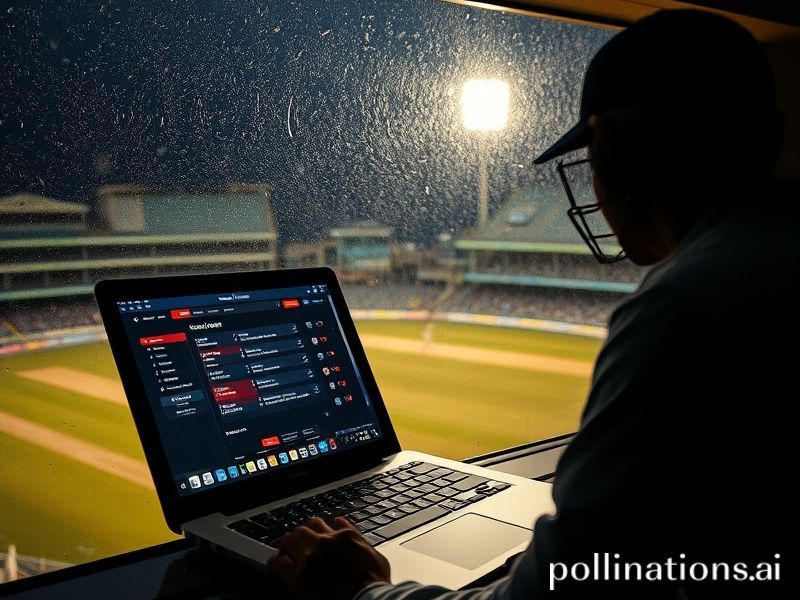Live Cricket Scores: How a Dot-Ball Unites the Planet While It Falls Apart
Live Cricket Scores: The World’s Most Expensive Way to Watch a Dot-Ball
By the time you refresh the app for the fourth time in thirty seconds, a Ukrainian drone has probably changed postal codes, a Japanese pension fund has quietly bought another slice of Sri Lankan sovereign debt, and somewhere in Lagos a teenager just sold a bootleg Virat Kohli jersey on WhatsApp. Yet the only thing truly vibrating across five continents is the little red circle that says “0.1 – 0/0 (Sharma 0*, Gill 0*)”. Welcome to the global narcotic known as live cricket scores, where geopolitics pauses for a wide ball and the planet’s attention deficit disorder finds its paradoxical still point.
From the tin-roofed tea stalls of Dhaka to the climate-controlled trading floors of Canary Wharf, the same scorecard flickers. In the latter, a hedge-fund quant who can price carbon futures in his sleep is suddenly sweating over whether Bangladesh needs 38 off 24 or 39—numbers that, in any other context, would barely buy you a lukewarm flat white. Meanwhile, in Mirpur, the street vendor whose livelihood literally depends on the price of onions is using the same 4G signal to check if Liton Das has finally remembered how to run between wickets. The great equalizer isn’t democracy; it’s a refresh button.
Consider the absurdity: a game invented by shepherds with too much free time on English grass is now the thin digital thread that keeps the diaspora from Melbourne to Mississauga tethered to a homeland they fled for better Wi-Fi. The Pakistani Uber driver in Oslo can tell you Shaheen Afridi’s economy rate to two decimal places but hasn’t spoken to his uncle in Faisalabad since Eid. The Indian cardiologist in New Jersey times coronary stent insertions between overs, muttering “one more dot ball” like a secular mantra. Somewhere Jacques Derrida is rolling in his grave, muttering about différance, but nobody hears because the death rattle coincided with a DRS review.
Of course, the real economy has noticed. Bookmakers in the gray markets of Karachi and the whiter-than-white ones in London both price futures on whether the next delivery will be a dot, a single, or a spot-fix. Cryptocurrency exchanges in Singapore list tokens pegged to the fall of wickets; the volatility is lower than Bitcoin, but so is the moral ceiling. Meanwhile, telecoms in Kigali hawk “World Cup bundles” that cost more than the average monthly wage yet sell out in hours, proving that Maslow’s hierarchy needs an appendix: right above food and shelter sits “ball-by-ball commentary in Kinyarwanda.”
The environmental footprint is exquisite. Every time twelve million users simultaneously ping the Cricbuzz servers, a small coal plant in Jharkhand coughs like an asthmatic fast bowler. Yet we call it the “gentleman’s game.” Carbon offsets are purchased by the same Gulf sheikhdom whose stadiums were built by men who can’t afford the data plan to see the scores. Somewhere a polar bear shrugs—if it still can.
And then there is the diplomacy of it all. When India plays Pakistan, the Line of Control is mirrored by a line of code: a single server crash could spark more panic than a UN Security Council veto. Embassies in hostile capitals host “cricket nights” where spies pretend to care about yorker lengths while actually stealing each other’s canapés. During the 2021 T20 semi-final, the New Zealand foreign minister claims he secured a free-trade clause while the Kiwi batsman was hitting a six. No one has independently verified this, but the deal passed, so perhaps the sport is worth its own WTO category.
Yet for all the grand narratives, the final truth is microscopic. A 14-year-old in Harare with a cracked Tecno phone and a solar panel the size of a passport refreshes the page and sees Zimbabwe at 67-5. He exhales, not because he expected better, but because the certainty of disappointment is itself a kind of comfort in a country that hasn’t had a stable currency since he was born. Somewhere in the same moment, an English retiree in Marbella drops his artisanal gin because Joe Root just got out for another pretty 30-something. Both men swear in languages they do not share, united by the exquisite futility of hope.
And still the score ticks over: 0.2 – 0/0. The planet spins, markets convulse, glaciers calve, but the dot ball remains eternal. Refresh, refresh, refresh—until the last server goes dark and the final cricket fan closes the app, only to discover the apocalypse happened during the strategic timeout. At least he saw it coming one ball at a time.







